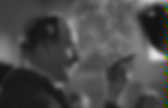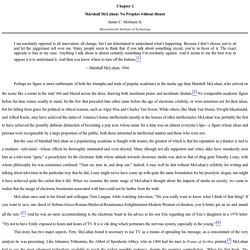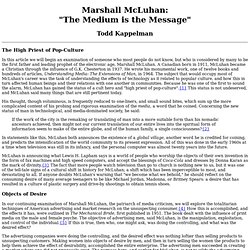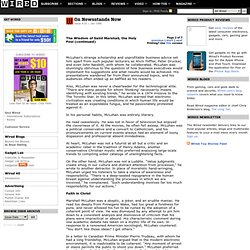

Marshall McLuhan: No Prophet Without Honor. Chapter 2 Marshall McLuhan: No Prophet without Honor James C.

Morrison Jr. Massachusetts Institute of Technology I am resolutely opposed to all innovation, all change, but I am determined to understand what’s happening. —Marshall McLuhan, 1966 Perhaps no figure is more emblematic of both the triumphs and trials of popular academics in the media age than Marshall McLuhan, who arrived on the scene like a comet in the mid-’60s and blazed across the skies, drawing both inordinate praise and inordinate disdain.[2] No comparable academic figure before his time comes readily to mind, for the few that preceded him either came before the age of electronic celebrity, or were notorious not for their ideas, but for falling from grace for political or ethical reasons, such as Alger Hiss and Charles Van Doren.
McLuhan once said to his friend and colleague Tom Langan, while watching television, “Do you really want to know what I think of that thing? This irony has two major aspects. 1. 2. 3. Marshall McLuhan: "The Medium is the Message" The High Priest of Pop-Culture In this article we will begin an examination of someone who most people do not know, but who is considered by many to be the first father and leading prophet of the electronic age, Marshall McLuhan.

A Canadian born in 1911, McLuhan became a Christian through the influence of G.K. Chesterton in 1937. He wrote his monumental work, one of twelve books and hundreds of articles, Understanding Media: The Extensions of Man, in 1964. The subject that would occupy most of McLuhan's career was the task of understanding the effects of technology as it related to popular culture, and how this in turn affected human beings and their relations with one another in communities.
His thought, though voluminous, is frequently reduced to one-liners, and small sound bites, which sum up the more complicated content of his probing and rigorous examination of the media, a word that he coined. McLuhan is announcing what Lewis H. Objects of Desire Four Questions Applied to Media. Marshall McLuhan’s Christianity. In Which We Know Nothing Of His Work. Streamlined All of the critic Marshall McLuhan's work is about communication, so taking stock of his rhetorical inventory in his letters is dizzying work.

He appears to have an easy facility with faking the truth — it is a means to an end, like any editorial workaround, or smash cut. He was capable of expressing himself facily in a variety of situations, but he often worked hard to obscure the point. His casual correspondence comprises a complete theoretical gesture on behalf of a person you're never sure exists. In letters to Hubert Humphrey, Tom Wolfe, John Cage, Buckminster Fuller, and Woody Allen among others, he demonstrates a panacea for the disconnected. Ashley Montagu was a British-American anthropologist born Israel Ehrenberg. August 10th, 1964 to ASHLEY MONTAGU Dear Ashley: Good of you to ask me to contribute to your volume.
One thing that comes to mind that is not in that volume concerns the habit of new media in swallowing older media, transforming them strangely. Marshall McLuhan's "The Medium is the Message" by Brad Plogsted. Wired 4.01: The Wisdom of Saint Marshall, the Holy Fool. The Wisdom of Saint Marshall, the Holy Fool (continued) McLuhan's strange scholarship and unprofitable business advice set him apart from such popular lecturers as Alvin Toffler, Peter Drucker, and even John Naisbitt, with whom he collaborated.

McLuhan was stunningly oblivious to the question of how business executives would implement his suggestions and what results would be achieved. His presentations wandered far from their announced topics, and his audiences often ended up as baffled as his readers. Also, McLuhan was never a cheerleader for the technological elite. "There are many people for whom 'thinking' necessarily means identifying with existing trends," he wrote in a 1974 missive to the The Toronto Star. In his personal habits, McLuhan was entirely literary. He read ceaselessly. On the other hand, McLuhan was not a Luddite.
Faith in Christ Marshall McLuhan was a skeptic, a joker, and an erudite maniac.